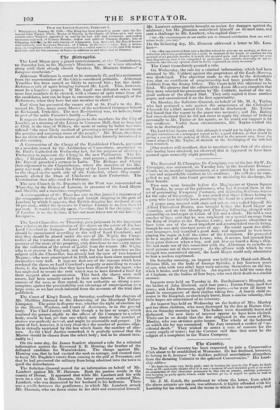The Lord Chancellor, on Thursday, gave judgment in the important
case relative to the manumission of the slaves on the estate of the late Lord Crawford in Antigua. Lord Brougham decreed, that the slaves should be emancipated according to the will of Lord Crawfurd ; and that they should be placed under the care of Mr. Wight, the Comp- troller of the Customs at Antigua ; who should also be appointed the receiver of the rents of the property, with directions to use every means for the collection of the arrear of 2,500/. from the tenant. Mr. Wight, who is at present in England, and who has had an interview on the subject with the Chancellor, has already had the care of two hundred Negroes, who were emancipated in 1829, and who have since conducted themselves very well. It appears that one of the reasons which have rendered the slaves on Lord Crawfurd's property so unwilling to remain there, is the knowledge that they have been ill-used by the agent, who has neglected to secure the rent which was to have formed a fund for their support after manumission. This fund, the slaves were well aware, had been actually earned by their own labour. The circum- stances of the case, as thus stated, do not authorize so strong a pre- sumption against the practicability and advantage of emancipation on a large scale, as we last week inferred from the accounts of the trial then published.
The Court of King's Bench, on Saturday, confirmed the election of Mr. Matthias Attwood to the Mastership of the Merchant Tailors' Company. The point in dispute was, whether the right of election lay in the Master, Wardens, and Cot= of Assistants, or in the general body. The Chief Justice said, that though a by-law or usage, which confined the persons eligible to • the offices of the Company to a select body, would be bad, yet that one which only limited the number of electors was perfectly natural, and might be reasonable and proper. [In point of fact, however, it is.very clear that the number of persons eligi- ble is virtually restricted by the law which limits the number of elec- tors. As the Chief Justice remarked, it is perfectly natural that the Master should be chosen from the select body; and so he almost inva- riably is.] On the same day, Sir James Scarlett obtained a rule for a criminal information against the Reverend S. B. Heming, the brother of the defeated candidate for Warwickshire. The charge against Mr. Heming was, that he had excited the mob to outrage, and created riots to keep Mr. Dugdale's voters from coming to the poll at Nuneaton, and that he had prevented the military from lieing admitted into the town to quell the disturbances.
The Solicitor-General moved for an information on behalf of Mr. Lambert against Mr. W. Hannan. Both the parties reside in the county of Dorset. It appeared that while Mr. Lambert and his wife were on a visit to Mr. Hannam, the latter gentleman seduced Mrs. Lambert, who was discovered by her husband in his bedroom. There was a scuffle between the gentlemen ; in which Mr. Lambert struck. Mr. Hannam, who ran down stairs in. his shirt and concealed himself.
Mr. Lambert subsequently brought an action for damages against the adulterer ; but Mr. Hannam considered himself an ill-used man, and sent a challenge to Mr. Lambert, who replied thus-
" sir—me circumstances do not entitle you to demand satisfaction from me, and I refuse to giv.t. you any."
On the following day, Mr. Hannam addressed a letter to Mr. Lam.. best-
" Sir—Having received from you a decided refusal to give me an apology, or that sa- tisfaction which one gentleman has a right to demand at the hands of another for the grossest of all possible insults, it is with the greatest pain and deepest regret fur your own degradation that I am compelled to pronounce you entirely unworthy of my re- sentment, and this my opinion shall be freely expressed on every occasion."
The Court immediately granted a rule.
On Wednesday, the rule for a criminal information, which had been obtained by Mr. Cobbett against the proprietors of the Leeds Mercury, was discharged. The objection made to the rule by the defendants was, that no certificate of proprietorship had been produced by Mr. Cobbett from the Stamp Office. The Court held this objection to be fatal. We observe that the editors of the Leeds Mercury complain that they were selected for prosecution by'Mr. Cobbett, instead of the ori- ginal authors of the alleged libel. They only copied it from another paper, and contradicted it on the first opportunity.
On Monday, the Solicitor-General, on behalf of Mr. M. A. Taylor, who had procured a rule against the proprietors of the Chelmsfird Chronicle for a libel, moved that the rule be discharged. Mr. Taylor had found that the report in the paper was accurate ; and Mr. Baring had since declared that be did not mean to apply the charge of bribery personally to Mr. Taylor or his agents, as he could not support it by any evidence. Under these circumstances, Mr. Taylor wished the rule to be discharged.
The Lord Chief Justice said, that although it would not be right to allow the alleged correctness of a newspaper report to be a good defence, as that would be giving a receipt for the making of libels, yet that in the present case, from the course adopted by Mr. Taylor, all obstacle to the discharging of the rule had been removed.
[Our readers will recollect, that in mentioning the fact of the above rule having been obtained, we observed that it appeared to have been granted upon unusually slight grounds.]












 Previous page
Previous page